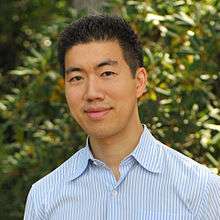David R. Liu
| David Ruchien Liu | |
|---|---|
 David R. Liu (taken in 2012) | |
| Born |
June 12, 1973 Riverside, California |
| Residence | Lexington, Massachusetts |
| Citizenship | United States |
| Institutions | Harvard University |
| Alma mater | Riverside Poly High School, Harvard University, University of California, Berkeley |
| Doctoral advisor | Peter G. Schultz |
| Other academic advisors | E.J. Corey |
| Known for | Nucleic acid templated chemistry, Directed evolution |
David Ruchien Liu (born June 12, 1973 in Riverside, California) is an American chemist and chemical biologist, best known for his work on the directed evolution of biological and synthetic molecules and as a founder of biotechnology companies.
Early life and education
Liu's parents immigrated to the United States from Taiwan and met in graduate school at UCLA. His father is an aerospace engineer; his mother is a retired physics professor at U. C. Riverside. Liu is a graduate of Riverside Poly High School. While in high school he finished second in the 1990 national Westinghouse Science Talent Search. He received a B.A. in chemistry from Harvard in 1994, graduating summa cum laude and 1st out of 1,641 students. While an undergraduate, he worked in the synthetic chemistry laboratory of Nobel Laureate E.J. Corey.[1][2]
Liu received his Ph.D. from UC Berkeley in 1999, supervised by Peter G. Schultz.[3][4]
Academic career
Immediately after receiving his Ph.D., Liu became assistant professor of chemistry and chemical biology at Harvard, in 1999. He was promoted to associate professor in 2003, and to full professor in 2005, at which time he also became a Howard Hughes Medical Investigator.[3] He was honored as a Harvard College Professor in 2007, in part for his undergraduate teaching. His introductory life sciences course, beginning in 2005, became Harvard's largest natural sciences course.[5]
Liu's additional honors and awards include the NSF CAREER award (2001), Alfred P. Sloan Foundation Research Fellow (2002), the American Chemical Society Pure Chemistry Award (2006),
Research
Liu's research group developed DNA-templated organic synthesis (DTS), a technique to translate DNA sequences into synthetic small molecules, rather than proteins, and applied DTS to the discovery of bioactive small molecules and new chemical reactions.[6][7][8][9] He also developed phage-assisted continuous evolution (PACE), a technique that uses the short 10-minute lifespan of the M13 bacteriophage to achieve the rapid evolution of useful proteins.[2] The group also developed methods for using DNA templates for the synthesis of new polymers with tailor-made properties,[1][10] as well as methods for using "supercharged" proteins of unusually high net charge to deliver macromolecules into mammalian cells in vitro and in vivo.[11]
Liu holds 9 U.S. patents (2013) and is a founder of three biotechnology companies, Permeon Biologics, which develops a class of proteins that transport antibodies into cells; Ensemble Therapeutics, which develops potential drugs with a macrocyclic ring structure; and Editas Medicine, which seeks to treat disease through genome engineering.
Personal life and other activities
Liu was in 2008-2009 a member of the Defense Science Study Group. He is a member of the JASON Advisory Group.[4][12]
During the Boston Marathon bomber manhunt, Liu studied the time lags between reports on UStream and Twitter and corresponding reports in the traditional news media.[13]
References
- 1 2 Steve Bradt, "Chemist, card shark Liu takes off", Harvard Gazette (June 2, 2005)
- 1 2 GoldSea Asian-American Business, "David Liu Speeds Up Evolution of Therapeutic Proteins" (April 18, 2011)
- 1 2 Howard Hughes Medical Institute, "HHMI Investigators: David R. Liu, Ph.D."
- 1 2 Harvard University, Liu Group, "Curriculum Vitae: David Ruchien Liu"
- ↑ Steve Bradt, "Five honored as Harvard College Professors", Harvard Gazette (May 10, 2007)
- ↑ Gartner, ZJ; Liu, DR (July 2001). "The generality of DNA-templated synthesis as a basis for evolving non-natural small molecules". J. Am. Chem. Soc. 123: 6961–3. doi:10.1021/ja015873n. PMC 2820563
 . PMID 11448217.
. PMID 11448217. - ↑ Kanan, MW; Rozenman, MM; Sakurai, K; Snyder, TM; Liu, DR (2004). "Reaction discovery enabled by DNA-templated synthesis and in vitro selection". Nature. 431: 545–9. doi:10.1038/nature02920. PMC 2814052
 . PMID 15457254.
. PMID 15457254. - ↑ Gartner, ZJ; Tse, BN; Grubina, R; Doyon, JB; Snyder, TM; Liu, DR (September 2004). "DNA-templated organic synthesis and selection of a library of macrocycles". Science. 305: 1601–5. doi:10.1126/science.1102629. PMC 2814051
 . PMID 15319493.
. PMID 15319493. - ↑ Georghiou, G; Kleiner, RE; Pulkoski-Gross, M; Liu, DR; Seeliger, MA (2012). "Highly specific, bisubstrate-competitive Src inhibitors from DNA-templated macrocycles". Nat. Chem. Biol. 8: 366–74. doi:10.1038/nchembio.792. PMC 3307835
 . PMID 22344177.
. PMID 22344177. - ↑ Peter Reuell, "Evolutionary oomph", Harvard Gazette (April 1, 2013)
- ↑ Cronican, JJ; Thompson, DB; Beier, KT; McNaughton, BR; Cepko, CL; Liu, DR (2010). "Potent delivery of functional proteins into Mammalian cells in vitro and in vivo using a supercharged protein". ACS Chem. Biol. 5: 747–52. doi:10.1021/cb1001153. PMC 2924640
 . PMID 20545362.
. PMID 20545362. - ↑ Institute for Defense Analyses, "Defense Science Study Group"
- ↑ Alvin Powell, "Your own news platform", Harvard Gazette (April 22, 2013)